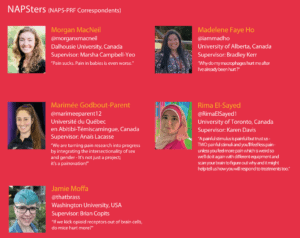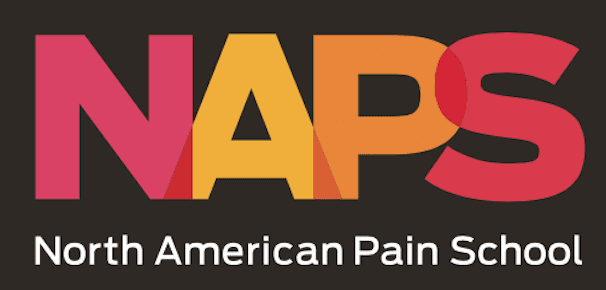Five early-career pain researchers participated in the PRF-NAPS Correspondents program during the 2024 North American Pain School, which took place 23-28 June in Montebello, Québec City, Canada. The Correspondents program is a unique science communication training program that provides participants with knowledge and skills needed to communicate science effectively to a wide range of pain researchers, patients, and the greater public. The Correspondents conducted interviews with NAPS Visiting Faculty and Patient Partners and blogged, too! Take a look at their final blog posts reflecting on NAPS below.
![]()
See previous blog posts about this meeting
NAPS Blog Posts: Reflections
“To Pain School, Thanks for Everything! Madelene Ho”
It’s hard to return to our respective labs after such an intense week at NAPS. What do we do in the evening when there are no workshops? What should I eat for breakfast when there are no more crêpes?
Nervous, animated, privileged, and surprised. These were the emotions I felt or anticipated before I left for NAPS. Did I experience them all? Definitely. Now, let’s revisit these emotions as I reflect on my NAPS experience.
NERVOUS
I felt nervous at times, especially during my presentation, as I pitched an app, and while creating a podcast. As the week progressed, the stress faded. The friendly and respectful atmosphere created by students and professors alike made the week enjoyable.
ANIMATED
There were diverse conferences, workshops, and activities, both indoors and outdoors, in teams and individually. The outdoor workshops were a highlight, with Visiting Faculty members generously sharing their experiences and humanizing topics rarely discussed in academia, like job negotiations, open-access publishing, and how to better communicate science.
PRIVILEGED
I felt privileged to be selected for NAPS, and even more so after discussing scientific research with these brilliant students. The wealth of knowledge gained in one week exceeded my expectations. It simultaneously felt like we were there for a month and only 24 hours.
SURPRISED
I set a goal for myself to embrace surprises, and that’s what I did. I stepped out of my comfort zone multiple times (we often didn’t have a choice), and yes, I even rode the rafting waves. I did end up with a black eye, but it was worth it!
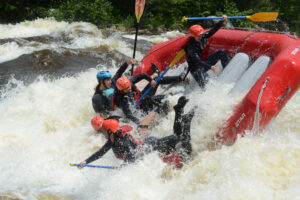
Would I recommend NAPS to the next group of researchers? Absolutely. It was an unforgettable experience, with knowledge that will serve me throughout my life, and connections I hope to keep for a long time. The NAPS effect will live on, both in my memories and in our WhatsApp group!
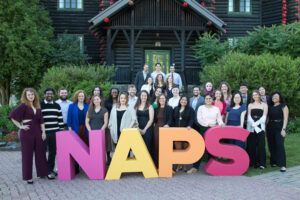
Marimée Godbout-Parent is a PhD candidate at the Université du Québec en Abitibi-Témiscamingue, Canada. You can follow her on Twitter/X – @marimeeparent12.
“To Pain School, Thanks for Everything! Madelene Ho”
Today’s “self-actualization journey” update: 90% complete.
I say this because NAPS was a total success, and I feel I’m 90% of the way toward realizing my potential future in pain research. NAPS was such a blessing and a privilege. When lab mates, friends, and family back home have asked how NAPS went, all I can say is that it was invigorating and life changing. More specifically I’ve told them:
1. I made so many friends, which has two major advantages:
- Although many of them work on topics and in fields far from my research, we can now enrich each other’s interdisciplinary knowledge with a simple phone call!
- I’ve always struggled to keep up with pain literature. With all these new friends, it makes reading about their work (and their labs’ projects) so much more enjoyable. It’s uplifting to read about my friends’ accomplishments and hear about their new publications on social media!
2. I’ve built a comprehensive network to help me work on the next phase of my career after achieving my PhD. I’m seriously thinking about pursuing a postdoctoral position and eager to make my research skills more marketable, sustainable, and advocacy focused. Our careers don’t have to be a “straight line!”
3. I now have connections I want to share with my lab! I can share resources with my colleagues – who might become future NAPSters!
The long hours and days focused on one goal were worth it. My whole body was sore after whitewater rafting and closing the dance floor on our last night at 2 a.m. (while averaging four hours of sleep/night), but it was all time spent forging the bonds I alluded to in my Day 1 blog post.
I’d like to conclude my blog series by thanking the sponsors who made this possible. Cheers to NAPS’ funding partners, the University of Alberta’s Green and Gold Student Leadership and Professional Development Grant, and to my supervisors and the NAPS Selection Committee who believed in me and supported my self-actualization journey.
All these people have helped equip me with an active group chat among NAPSters, my prestigious NAPS graduation plaque, and memories for a lifetime. I’m excited to take on the last 10% of my journey alongside new friends and hopeful for the future of pain research.
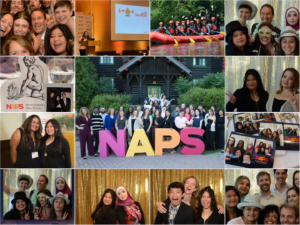
Madelene Faye Ho is a PhD student at the University of Alberta, Canada. You can follow her on Twitter/X and Instagram – @iammadho.
It’s been one week since the conclusion of NAPS, and I’m still bursting with excitement when I think about the experience! I thought NAPS would be your typical conference, but it turned out to be so much more.
Everything about NAPS exceeded my expectations. The program offered variety (one second, you’re learning about pain behaviors in mice; the next, you’re learning about generational trauma and empathy) and consistently ran on time (thanks, Jeff Mogil!). I loved that there were limited concurrent sessions, which allowed all of us NAPSters to attend sessions together.
NAPS provided so many opportunities for networking. Whether you were sitting beside your idol during a workshop, meeting someone new on a coffee break, or paddling through rapids with like-minded people who value their safety (yes, I was on the “baby boat”), I felt like I had the chance to truly connect with every NAPS attendee.
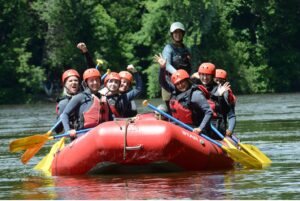
Being exposed to the scientific diversity gave me a new wave of motivation and excitement. While I didn’t want the week to end, I looked forward to going back home to work on my research. The content at NAPS opened my eyes to many different avenues that I could take my research in the future. Each session flooded me with project ideas, collaborative opportunities, and new methods for knowledge dissemination.
Overall, NAPS was better than I could have imagined. It stimulated ideas, promoted creativity, fostered collaboration, and instilled courage (I still can’t believe I went whitewater rafting!). I am fortunate for this once-in-a-PhD-student’s-lifetime opportunity. I am a proud 2024 NAPS grad!
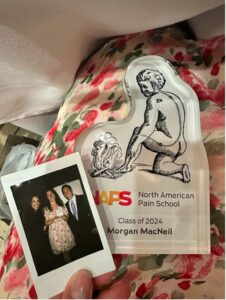
Morgan MacNeil, RN, is a PhD candidate at Dalhousie University, Canada. You can follow her on Twitter/X – @morganxmacneil.
On the last day of NAPS, Melanie Noel gave a moving talk about how traumatic adverse childhood experiences increase the risk of developing chronic pain and the sociocultural differences that put some children at greater risk. Optimistically, she also highlighted that despite these challenges, positive childhood experiences can counteract the effects of these traumatic experiences. Examples included the feeling of belonging in high school, participating in community traditions, being supported by friends, and having at least two non-parent adults who genuinely care. This demonstrates how powerful it is to have support from others and a sense of community/belonging.
The structure of NAPS created the ideal environment to develop a community outside of our labs and university “bubbles.” Having these connections with brilliant researchers and faculty mentors will undoubtedly help us through challenges in our scientific journey. Being surrounded by a reliable team also helps you face your fears, as I experienced during whitewater rafting. While the “baby boat” was on the same turbulent river as everyone else, I felt safe because together the group was strong, calm, and pushed through the waves in unison. We bonded through the trust we had in each other and were able to stay afloat to enjoy the leisurely parts of the river and help other boats that flipped.
Going into NAPS I dreamed of building this community outside of my lab – I feel lucky to have succeeded. NAPS may be over, but the impact and momentum it sparked in us trainees are not. In the short-term, we’ve returned to our labs feeling motivated and inspired. In the long-term, we’ve built friendships that will continue to impact our future careers.
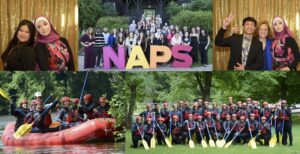
Rima El-Sayed is a PhD candidate at the University of Toronto, Canada. You can follow her on Twitter/X – @RimaElSayed1.
We were in the airport at an ungodly hour the morning after NAPS ended. Although we were exhausted, we were still basking in the glow of new friendships, and thinking of all the crazy stories we’d tell our coworkers, friends, and family when we got home.
At some point, we started working out how we were all connected – “Aren’t you in so-and-so’s lab?” and, “I think she went to grad school with my mentor!” – piecing together our places in an academic “family tree.” Sitting at a dingy table at the food court in the Montreal airport, I felt integrated within a research community where people knew my name, knew my mentor, and cared about answering the same kinds of questions I do.
I am the first graduate student in a new, still small lab, albeit one with an impressive academic genealogy. When I introduce myself in academic settings, I give my mentor’s name and his mentor’s name, going two “generations” back to situate myself within the community of pain research.
I’ve had a fantastic graduate school experience, and I wouldn’t change it for the world, but lately I’ve been feeling on the outside of the community, looking in. That was until I attended NAPS.
If you’d asked me before NAPS what I was going to do at the IASP 2024 World Congress on Pain this August, I’d have made vague comments about going to the poster hall and listening to some talks. Now, I have plans to explore Amsterdam with my fellow NAPSters. Before, I knew people like Jeff Mogil and Greg Corder from their papers – now, I’ve been flung off a raft with them.
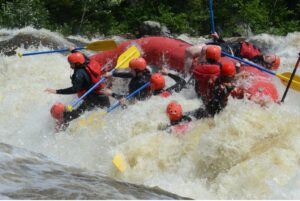
My boat – the “crazy boat” – in the process of dramatically capsizing on the last day of NAPS.
When I got back to St. Louis and told my partner everything, they summarized my entire experience: “It sounds like you found your people at NAPS.”
Jamie Moffa is a PhD candidate at Washington University, USA. You can follow them on Twitter/X – @thatbrass.
The 2024 PRF-NAPS Correspondents
